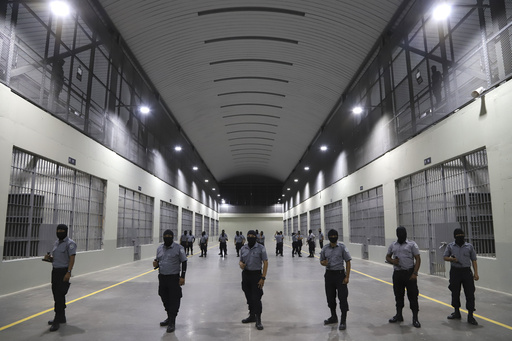
SAN JOSE, Costa Rica — On Tuesday, Secretary of State Marco Rubio addressed the media, highlighting a controversial proposal from El Salvador to accept and imprison violent offenders from the United States. While expressing clear legal concerns regarding the proposal, Rubio nevertheless described it as “very generous.” The decision on whether to proceed with this initiative ultimately rests with President Donald Trump.
Rubio’s discussions with Salvadoran President Nayib Bukele the day prior revealed an understanding that El Salvador would be willing to accept U.S. deportees of any nationality, including American citizens and lawful residents convicted of violent crimes. “We have a Constitution, and there are certainly legalities involved,” Rubio acknowledged at a press conference alongside Costa Rican President Rodrigo Chaves. He went on to commend the offer as unprecedented, suggesting it could provide a cost-effective solution for managing some of America’s most dangerous criminals. However, he noted that further decisions would need to be made by the administration.
During his visit to Central America, Rubio also addressed immigration matters, reflecting the Trump administration’s priorities. This comes at a time of significant upheaval within the U.S. Agency for International Development (USAID). Employees at the agency and the State Department are expressing fears about job security following apparent plans to streamline government operations as proposed by Elon Musk, who is overseeing a budget reduction initiative.
Just prior to Rubio’s visit, staff members from USAID and Democratic lawmakers were barred from entering their headquarters in Washington. This action coincided with Musk’s announcement that Trump had agreed with him to dissolve the aid agency. Thousands of USAID workers have already lost their jobs, and numerous international aid programs have been halted due to Trump’s freeze on foreign assistance initiated at the start of his presidency. Although Rubio proposed waivers for essential programs, a lack of clarity about what qualifies for exemptions continues to stifle global aid efforts.
Rubio expressed concern about the competence of organizations receiving U.S. funding, suggesting that if these groups fail to understand how to apply for waivers, it raises questions about their efficiencies. He emphasized that foreign aid should align with U.S. national interests, remarking, “I have long supported foreign aid. I continue to support foreign aid. But foreign aid is not charity.”
One notable program affected by these shifts is an HIV/AIDS initiative established under former President George W. Bush, which has been credited with saving millions of lives. Aid contractors have reported that millions of dollars’ worth of medications and supplies are stranded in ports due to restrictions on delivery.
As turmoil unfolded back in the U.S., Rubio met with Bukele in San Salvador, where the Salvadoran president reaffirmed the intentions behind the deportation offer, characterizing it as an opportunity for the U.S. to partially outsource its prison system. Bukele specified that only “convicted criminals” would be accepted and that the fees charged would be manageable for the U.S. but significant for El Salvador, helping to sustain its prison infrastructure.
The conditions within El Salvador’s prisons have been described as “harsh and dangerous,” with inadequate facilities for sanitation, water, and ventilation. Since March 2022, following a violent surge attributed to street gangs, the country has been under a state of emergency. Bukele’s administration responded by suspending critical rights, leading to the detention of over 83,000 individuals without due process. In 2023, Bukele inaugurated a new prison designed for 40,000 gang members, which has implemented strict measures, such as reducing meal availability and eliminating inmate visits.
El Salvador, once reputed as one of the world’s most dangerous nations, saw a record low of only 114 homicides in the previous year, a development that has contributed to Bukele’s rising popularity among the population of approximately 6 million. Migration was a key focus for Rubio as he traveled through Panama, El Salvador, Costa Rica, Guatemala, and the Dominican Republic, though he faced persistent challenges related to the Trump administration’s policy alterations.
Rubio informed reporters in San Salvador that he is currently acting as USAID’s administrator but emphasized he had delegated responsibilities for its daily management. In a letter to lawmakers, he conveyed intentions for the State Department to collaborate with Congress to reorganize and possibly absorb certain components of USAID. He noted that the agency’s processes suffer from a lack of coordination, which hampers the President’s capacity to effectively manage foreign relations. Rubio suggested that there may be a need to reorganize missions and functions within USAID, potentially absorbing them into the State Department, while the agency itself might face abolition in accordance with legal guidelines.

